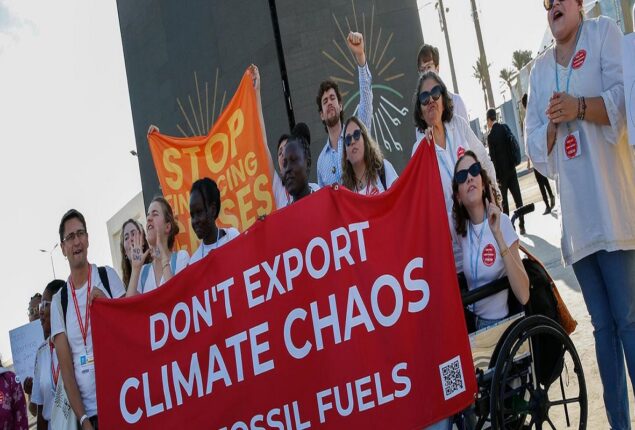Egypt spying on COP27 delegates
The software has been downloaded more than 10,000 times on Google Play...

Energy security and decarbonization at COP27
Decarbonizing the world’s energy while ensuring uninterrupted availability at affordable rates is the task at this year’s climate summit, amid catastrophic climate events and the global energy crisis.
After invading Ukraine in February, Russia, the world’s top fossil fuel exporter in 2021, exposed the globe to significant energy price instability, highlighting the global economy’s perilous reliance on fossil fuels and delayed transition to renewables.
“Decarbonization is the basis of enhanced energy security,” says Carbon Tracker’s Richard Folland.
According to Folland, “renewable-based systems can give improved energy independence by being domestically generated”
The International Energy Agency (IEA) determined the Ukraine crisis was a stimulus for clean energy transition, despite some nations turning to band-aid methods to make up for decreased Russian natural gas shipments.
UN Secretary-General António Guterres has called renewables “the only credible road” to energy security.
COP27 delegates favor diverse power generation, including nuclear and fossil fuels.
Wind turbines, solar panels, and electric vehicles are key to sustainable energy, but their spread is gradual.
IEA forecasts annual investment to exceed $2 trillion by 2030, but this is only half what’s needed to attain net zero goals.
Ben McWilliams, climate policy specialist at Bruegel, told Al Jazeera that connecting renewables to energy grids and extending this across the economy will decarbonize a lot.
Bureaucratic difficulties and regulatory obstacles have caused protracted delays, McWilliams said, but he recognized the task ahead “is a tremendous infrastructure build-out” that has typically taken decades rather than years.
As markets embrace intermittent renewable energy sources like wind and solar, several COP27 players contended nuclear power facilities and fossil fuel-based solutions are needed to preserve supply-demand balance.
Wednesday in Sharm el-Sheikh, nuclear energy enthusiasts argued that atomic power is a safe and cost-effective means to decarbonize the earth.
John Kerry addressed COP27, “We can’t get net zero by 2050 without nuclear power.”
The US has committed billions of dollars for nuclear energy projects as part of a bigger drive to decarbonize its economy, including a new generation of small nuclear power reactors that run on HALEU enriched uranium – which is currently manufactured only by Russia.
The EU said last week it will sign initial agreements for imports of “green” hydrogen with Kazakhstan, Egypt, and Namibia during COP27.
As part of its diversification plan, it revived the Baltic Pipe and categorized the EastMed pipeline as a Project of Common Interest (PCIs).
Scientists say leaving coal, oil, and gas in the ground is necessary to meet Paris Agreement goals and keep warming below 1.5 degrees Celsius (2.7 degrees Fahrenheit). However, the EU has endorsed fossil gas as a “transition” fuel under its sustainable finance taxonomy, and African stakeholders at COP27 are advocating for fossil fuels to expand their economies and electricity access.
One debate at COP27 was whether African states should receive financial support to develop, use, and export natural gas as part of a “just” energy transition that considers economic considerations.
Renewable energy enthusiasts are locked into long-term contracts and infrastructure projects that could become stranded assets.
It’s challenging to make investments because it’s unclear how much hydrogen we’ll need, McWilliams added. According to Nature research, half of the world’s fossil fuel assets will be worthless by 2036.
Some groups say a lack of political will prevents a broad renewables rollout. More than 600 fossil fuel sector delegates are attending this year’s climate talks, more than the 10 most climate-affected countries combined.
Corporate Europe Observatory researcher Pascoe Sabido told Al Jazeera that long-term investments will increase household instability.
Shell, TotalEnergies, Eni, and Repsol have made 78 billion euros ($80.8bn) so far this year, but more than 100 lobby sessions with high-level EU Commission officials delayed cost-of-living measures.
Catch all the World News, Breaking News Event and Latest News Updates on The BOL News
Download The BOL News App to get the Daily News Update & Follow us on Google News.